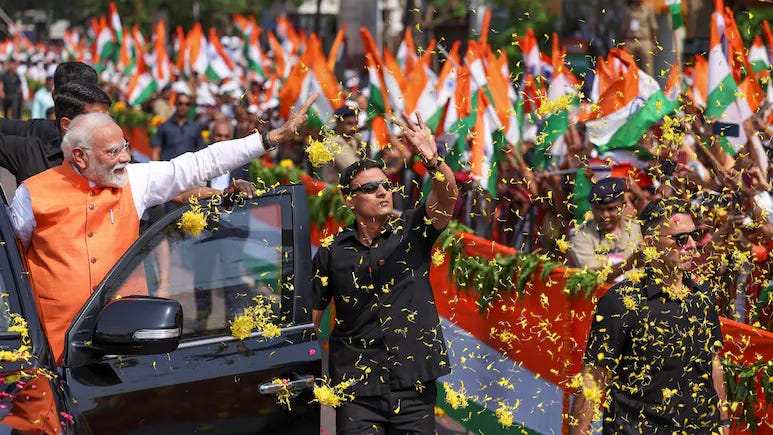
“Did you notice PM Modi’s roadshow?” read a WhatsApp message from a member of my extended family. “Everywhere, you saw the national flag — not a single BJP flag to be seen. Shows you how united the nation is — but of course, these are the kinds of things you’ll never write about, no? Jai Hind!”
Okay, so let me write about the roadshow.
It was a “splendid roadshow” — a “delighted” Modi says so himself, and I should, as I have been asked to, take positive note that the recent conflict with Pakistan, which entailed loss of lives and property, afforded the PM this opportunity. And yes, there were Indian flags everywhere; also flowers and leaves in red, white and green decking the trees and the barricades that kept the hoi polloi at bay..
For all of which, my WA correspondent gives credit to a “united nation”, while I prefer to render unto the organizers — a mix of local BJP and RSS cadres — the credit due to them. For they were the ones who brought in the crowds, organized the flags and the decorations, and distributed the flower petals to be showered on the VVIP. What, you thought hundreds of people just happened to have similar sized, brand new national flags lying around at home that they could bring to the rally?
It wasn’t just the party cadres — even the local administration was pressed into service to ensure that the spectacle was perfect. So we saw Colonel Sofia Qureshi’s twin sister and other members of the family (see image above), showering rose petals on Modi. We saw — though that is not visible in this image — that they were standing in front of a banner that, in Gujarati, proclaimed “Deep reverence to the Army, and complete support to Modi”.
What we didn’t see, and wouldn’t have known if a reporter hadn’t thought to ask, is that the office of the collector called the Colonel’s family and asked them to be there. We didn’t see the organizers putting up the banner assuring “complete support” for the Colonel’s family to be posed under.
Why the spectacle? For answers, look to Plato’s allegory of the cave, from his seminal work The Republic.
Briefly, Plato imagined a group of people who have been imprisoned in a dark cave since birth. They're chained in such a way that they can only face the wall in front of them. Behind them burns a fire, and between the fire and the prisoners, puppeteers move objects that cast outsize shadows on the wall. These shadows constitute the prisoners' entire reality — they have never seen a world outside the cave, or known a reality beyond the shadows on the wall.
One day, a prisoner manages to free himself and work his way out of the cave. Initially, he's blinded by the bright light of the sun, and overwhelmed by the unfamiliar sights. As he ascends out of the cave and into the sunlight, he gradually acclimates and begins to see the world in its true form. He realizes that the shadows on the wall were mere illusions, and he now understands the deeper reality beyond the cave.
The prisoner returns to the cave to enlighten the others. However his eyes, now accustomed to sunlight, struggle to adjust to the darkness. The remaining prisoners interpret his disorientation as evidence that venturing outside is harmful. They resist his attempts to free them, preferring the familiar shadows over the unknown reality.
We are, all of us, living in Plato’s cave now. Our reality is these shadows on the wall that show us a strong leader surrounded by adoring crowds — a reality shaped for us by the puppeteers tasked with organizing these spectacles.
A pliant, compromised media and various institutions serve as force multipliers — thus, various wings of our armed forces put out a daily drip-feed of images of our triumphs and demonstrations of our strength; our “war reporters” continue to beat the drum (A Shiv Aroor says there is a “public roar” for indigenous engines, leading to the inevitable hashtag — though why it needs a “public roar”, and why the government hasn’t done it despite all the talk about India “powering” defence growth, joins the long list of unasked questions.)
To what end, all this? The erasure of our memory.
The lives lost in Pahalgam, and during Operation Sindhoor, are being erased from the public consciousness, and replaced with images of Caesar entering Rome in triumph.
When a Caesar held a Triumph, wounded and maimed soldiers were smuggled into the city under cover of the night; only the strong, able-bodied soldiers — all clad in burnished armor, none wearing the marks of battle — marched behind Caesar’s chariot.
The same principle applies: Modi has not visited the families of victims of the terror attack, or the areas where Pakistan shells damaged homes in J&K and took lives, because such images of grief and loss do nothing to burnish the image of the strongman, the Caesar triumphant.
The roadshow and related festivities were also an opportunity for Modi to field-test applause lines in preparation for Bihar.
To this end, he tried out “Not blood, but hot sindhoor, flows in Modi’s veins” and “eat rotis, or eat my golis” (the latter the sort of cringeworthy line that even Sunny Deol’s scriptwriters would discard as being too over the top).
And more recently, this: “We must encourage traders to pledge that they will not sell foreign goods. But unfortunately, even Ganesh idols come from abroad, small-eyed Ganesh idols whose eyes don't even open properly.”
A man, a leader, who has not had the courage to name China any time these last three years, despite that country’s repeated transgressions, resorts to a sly racial slur — “small-eyed Ganeshas” — and puts the onus on small traders to fight his battle for him.
Memo: India’s major imports from China are electronics and telecommunications equipment (valued at approximately $47.67 billion); machinery and mechanical appliances (approx $27 billion); organic chemicals (approx $11.12 billion); plastics ($6.29 billion); optical, photographic, and medical instruments ($2.85 billion); iron and steel products ($2.99 billion); fertilizers ($2.61 billion), etc (Here is the full list).
And the main importers from China include Mahindra Logistics Ltd., Adani Logistics Ltd., DHL Logistics Pvt Ltd., Tata Motors., Dixon Technologies, Caplin Point Laboratories etc.
But sure, “small traders” should be “encouraged” to stop selling “small-eyed” Ganeshas. While, on the same day, the government of Uttar Pradesh announces that seven Chinese footwear firms will invest in the state.
To return to Plato’s cave for a moment, when the prisoner who managed to free himself returned to the cave and tried to tell the other prisoners of the reality he had seen outside the darkened cave, they were so upset at having their world-view altered that they beat him up.
Apropos, the Bombay High Court this week passed strictures against the Maharashtra government and the police officers for arresting and locking up a 19-year-old engineering student in Yerwada Central Jail for reposting an Instagram post critical of Operation Sindoor.
“Absolutely shocking,” the court said. Yes. Also, absolutely normal in the Plato’s cave we all inhabit. Meanwhile in the real world, residents of border villages in J&K’s Kupwara district are upset at the “paltry” government compensation handed out to those whose homes were damaged by Pakistani shelling. But never mind that — back in Plato’s cave, reality is being erased, our memories are being altered, one image, one roadshow, one event at a time…
PostScript: None of the above is an exclusively Indian, or BJP, phenomenon by the way.
Remember how, after the 2003 US invasion of Iraq, the failure to find weapons of mass destruction (WMDs) — the primary justification for the war — was a major embarrassment for the Bush administration? To shift focus, the administration organized media spectacles, such as Bush’s “Mission Accomplished” speech aboard an aircraft carrier, to distract from the failure. (That image of him in pilot’s gear — who and what does it remind you of?)
China, to cite another example, successfully erased Tiananmen Square from public memory through censorship, control of education, media blackouts and, over time, grand spectacles like the 2008 Beijing Olympics that helped redirect attention to a narrative of progress and stability.
Or take Rwanda. After the 1994 Rwandan genocide, the Rwandan Patriotic Front (RPF) government under Paul Kagame crafted a narrative of national unity and reconciliation, designed to move the public past the ethnic violence and suppress discussions of RPF’s own alleged war crimes during and after the genocide.
George Orwell’s concept of “memory holes” (1984) describes how regimes erase inconvenient truths by destroying records and rewriting history. In the context of Pahalgam, the Modi government’s focus on military triumphs and roadshows serves as a modern equivalent, diverting attention from security failures, from the lives lost, from property destroyed. Orwell’s idea of “doublethink” — holding contradictory beliefs — also applies, if you consider the simultaneous portrayal of Kashmir as both peaceful and as a battleground requiring military action.
Daniel Boorstin in his book The Image introduced the concept of the “pseudo-event”, and that is central to understanding Modi’s roadshows. These events are staged to dominate media and public attention. Boorstin argues that pseudo-events are designed to be reported, often overshadowing real events. (I had written about Boorstin and the pseudo-event at length here, so will spare you an encore — it might be worth your while to read, to understand the use of stage-managed events to block out reality).
(For more perspective, there is also Edward S. Herman and Noam Chomsky’s Manufacturing Consent, which argues that media, often aligned with state or corporate interests, filters information to support dominant narratives. Similarly, Pierre Nora’s concept of “sites of memory” suggests that governments emphasize certain events (e.g., Operation Sindoor) to construct collective memory while sidelining others (e.g., the attack itself).
All this to say, the view from outside the cave is not always idyllic; often, it is downright depressing — but it still beats living in the cave.




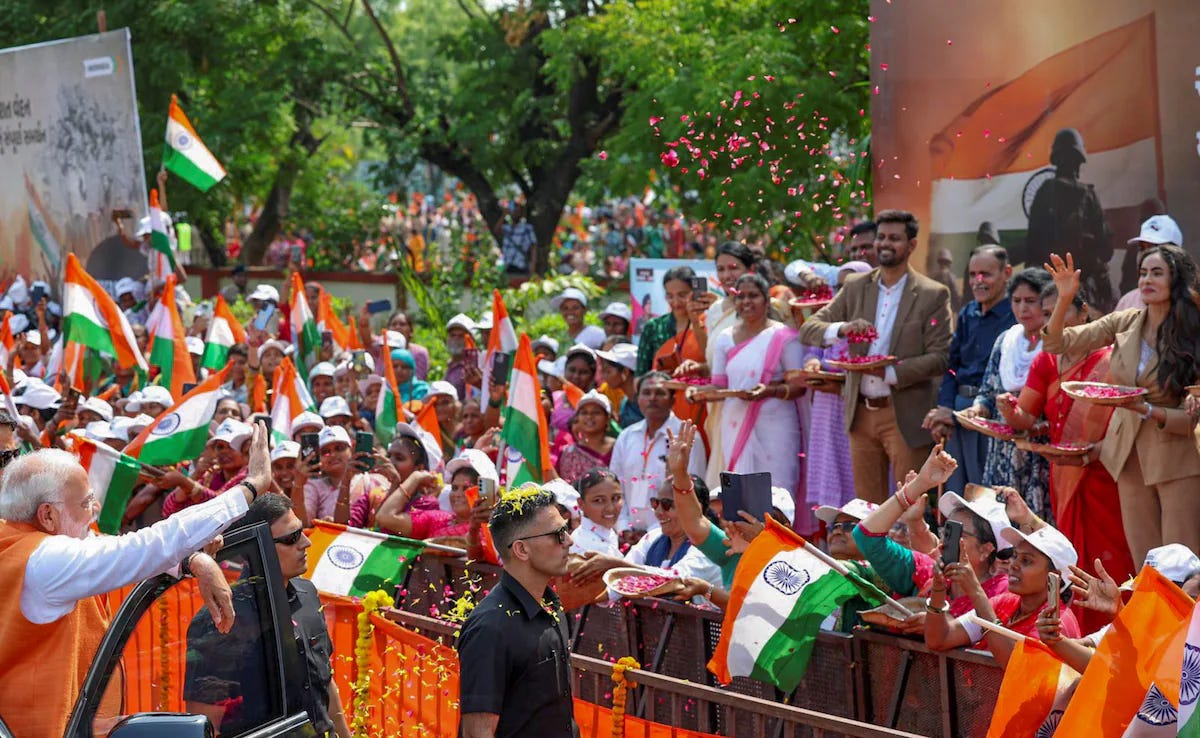
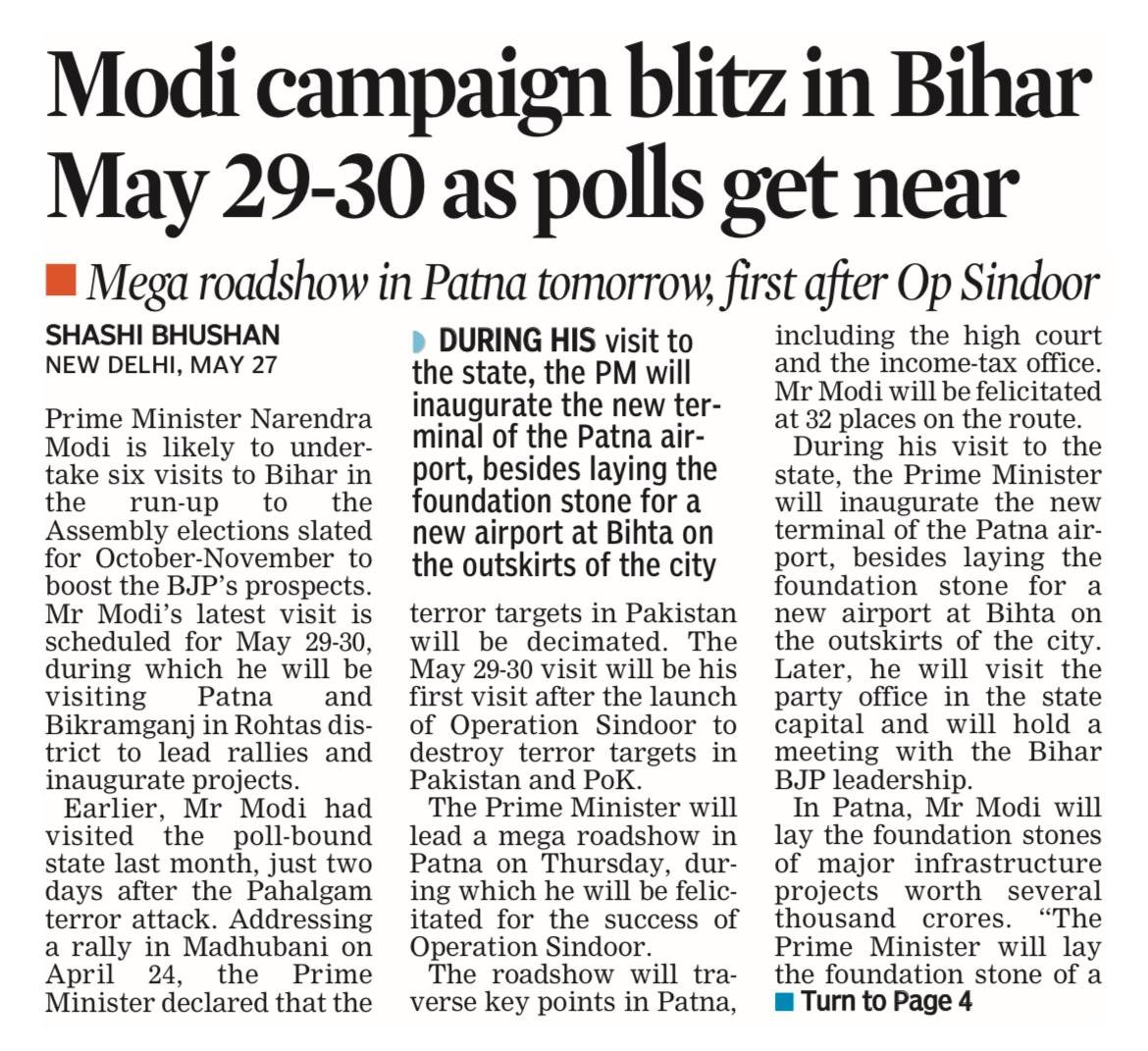
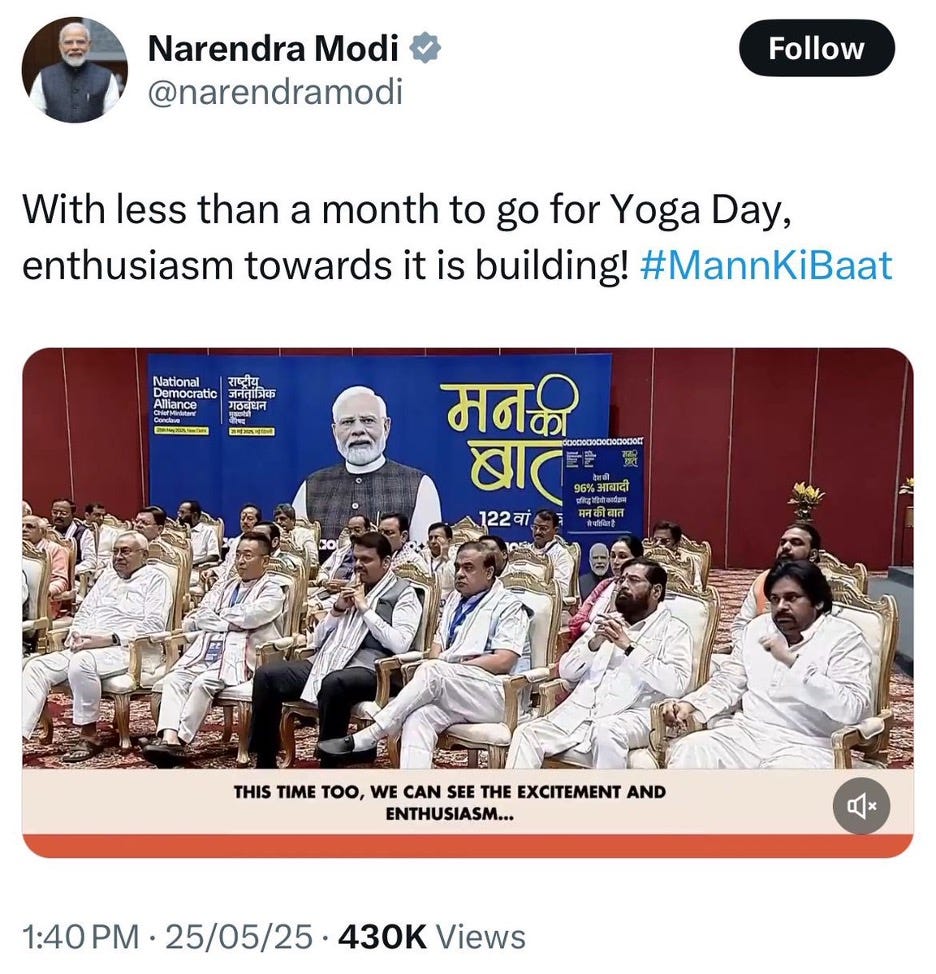
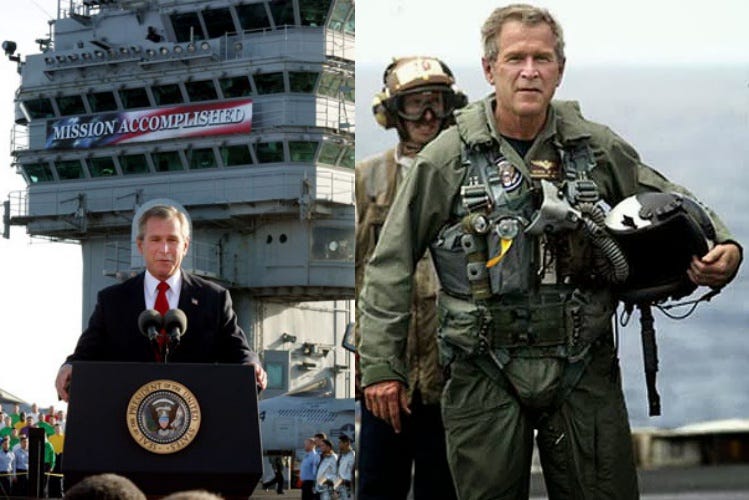
The other road show which is going on in the name of Global outreach by all party MPs descending on various state capitals beats my imagination.
After all what does Columbia and Panama have to do with the India Pakistan fight.Why would they care when they have no meat in the game. Besides they are in no position to influence global opinion.
As far as the other powers go,they have other considerations on which decisions are made and not on the merits of what Indian MPs wearing patriotism on their sleeve have to say.
Welcome to Plato's cave was a super one...Never thought in india's young democracy we reached so fast here..ready to hide in the cave and not see the sunlight "Forms" .. thanks good resemblance